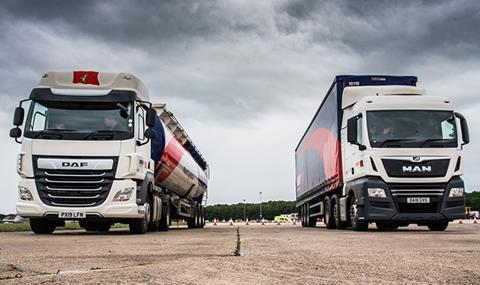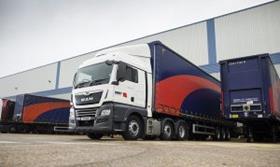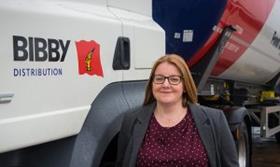
When MT last met with Bibby Distribution in the summer of 2017, the business was hard at work getting ‘back to the basics’ of strengthening its core transport and warehousing operations.
This included a network overhaul focusing on key geographical locations, investment in new fleet and warehousing management systems, reviewing low-margin work and a divestment of non-core divisions, such as driver agency, packaging and training arms (see box, below).
Out was the ‘logistics without limits’ concept and ambition to diversify into multiple business streams, replaced instead with a passion to strengthen and build upon its core logistics operation.
Newly appointed CEO and former CFO Richard Morson (pictured, right) says of the refocus: “The journey we've been on throughout the past two years, the pace of which increased in the latter half of 2018, is about getting back to what we are good at.

“We are a strong logistics provider and particularly strong on full load transport and that's what we are getting back to.”
Operational efficiency
The firm’s network restructure is now almost complete, with consolidation of smaller sites and a move towards a model of radial distribution from warehousing hubs. “We won't have sites specifically just for network, as this is an expensive luxury,” says Morson.
While in the back office, the route planning function has been centralised in a high-tech department, leaving the day-to-day management of loading, drivers and vehicle management to local teams.
This move has helped improve the utilisation of Bibby’s fleet, with vehicles in action more hours of the day, including nights and weekends where possible.
The company is also using technology and fleet innovation to retain and attract new customers. For example, 95% of its trailer fleet are high cube units, which prove extremely successful for its paper and packaging customers and retail businesses due to their capacity.
It has also established a new transport optimisation team, based at its Wakefield hub, which has full visibility of all loads and is tasked with finding backhaul loads.
“From a standing start of nil in 2018, it probably now equates to about £2.5m of revenue a year through that workstream,” says Morson. “No additional assets or people, it just drops onto the back of what we're doing and helps improve efficiency and fleet utilisation.”
Customer retention
During the latter half of 2018, the business also put a strong focus to its customer service levels, which saw a strong record of renewals into 2019 and gave it the ability to improve commercial rates where necessary.
“We're on a strong footing in terms of service levels and performance, so we can have those tougher conversations that we've had to have in the back part of last year,” says Morson.
Core sectors for Bibby Distribution in 2019 remain traditional full load transport, warehousing and associated network transport, and tankers delivering food and ingredients; the latter stemming primarily from the £26m buyout of Atchison Topeka in 2011.
But while the business has had ample opportunity to continue to expand its operation, it has been choosing to take things slow and steady as it continues its transformation.
“We'd taken a step back and said we want to get the service levels right - this has to be at the core of everything. Now we've got this right we will gradually take on work,” says Morson. “The organisation and the structure is lean and efficient but is capable of organic growth on top. With the strong retentions this year particularly, and some new business that we will announce shortly, it’s an exciting time.”
Bibby reports that it is ahead of budget and forecasts for this current operating year, and on track with the three-year operating plan it set at the start of 2019. “We're delivering everything we said would do, which is great,” says Morson.
Leading the way
The driving force behind Bibby’s restructure and focus is a determined, newly-formed executive team led by Morson, who took the reins in July 2018 following seven years with the business, most recently as CFO.
“I've been in finance roles within logistics for the past 20 years, but always wanted to be the CEO,” says Morson. “But you are leaving your comfort blanket behind. It's a big step, a big challenge.”
He has been supported in the move to his new role by parent company Bibby Line Group CEO John Cresswell, who joined the group in June 2018.
“I've had phenomenal support from him. To be his first appointment as a CEO means a lot to me. I've absolutely loved the job,” says Morson.

“For me, this isn't about a finance guy running a business, it's about a people person running a business, who is getting back to good core values and communicating and listening to the business.”
He is joined on the leadership team by Peter Clarkson, who took on the CFO role after seven years at Bibby himself, having previously worked with Morson at Nobert Dentressangle and TDG.
David Haworth (pictured, left) joined the executive team last year as HR director, while Dean Jones returned to Bibby again as operations director, having previously worked at Eddie Stobart.
The newest member of the team is Elspeth Doyle, who joined as general counsel bringing her legal expertise, but will also champion the firm’s diversity commitment.
Working together
“The energy level and enthusiasm and strength of the exec team are fantastic,” says Morson. “It's the strongest team I've worked in for the past 20 years in industry. There is a really good buzz around the place and we all work really well together.”
This connection has been fundamental in driving forward the culture change at Bibby to put employees at the heart of the business.
HR director Haworth says: “About this time last year, we sat in the room as an exec and said the critical thing for us was to go out and listen to people. So one of the core values therefore is called ‘Working together’.”
To get the ball rolling, the executive team went out on the road and visited staff at 62 sites over four months, with Morson attending every single visit.
The aim of this was twofold, explains Haworth: “One was to go out to our colleagues and tell them how the business is performing and share our views and visions; the second part was to listen to feedback.”
The company had previously carried out three engagement surveys over the past three years and while it had taken action on a number of issues raised, it hadn’t followed up on everything.
“We sort of bared our souls to our colleagues and said 'we've done some of this stuff, but we're now sitting opposite you and want to ask you what you think'. We got far more from listening and learning,” says Haworth. “That's when we started to recognise the value of flipping the pyramid. Instead of command and control and the person at the top being the expert, the reality is the people closest to the customer have a better understanding of what's required and how we can improve.”
Enabling change
The executive team wrote to each site and supported them in making necessary changes to the operation. In total, around 600 actions have been committed to, each one overseen by a member of the exec team.
These can vary from small items such as installing a microwave in a local depot canteen and leaky roofs, through to exciting ideas for the business and improving efficiency.
For example, on the fleet side of the business, whereas previously specification decisions were made at head office, the drivers had not been consulted.
“What we've done now is start to listen to the drivers using those trucks and there is so much good feedback, we're now making better, more informed business decisions,” says Morson.
Communication has indeed been one of the biggest win-wins to come out of the staff engagement exercise.
Rather than generic emails being sent to only those office-based staff with PCs, the business now uses social media such as Twitter and Facebook to reach everyone at depot level and on the road as well.
“We've had to really think about this,” says Morson. “We're trying to bring millennials and the new generation into the industry, and they want things on a tablet and social media.”
Top choice
And the effort spent on engaging with the workforce will be key in Bibby’s ambition to be the logistics employer of choice by 2021.
It has created a number of successful employee training schemes to both attract, train and retain skilled staff in the business.
The national shortage of drivers is a challenge for all logistics businesses, and Bibby has set its focus on this area to ensure it keeps a steady workforce.

A driver apprenticeship programme launched in March with a first intake of nine students. The 13-month course sees students achieve their C and C+E licences in the first few months and join the business as drivers, with the remainder of the programme completed after this.
The goal is to train up to 50 drivers in the first 12 months.
As well as training vital new drivers, Bibby is pleased the scheme is also shifting the demographic of its workforce.
“We reflect the rest of the industry,” says Haworth. “Roughly 2% of our driver population are female and 98% are male.
“It's baby steps I guess with our first apprentices, but within that group we have two females. We've also got people from diverse ethnic backgrounds because we believe this the route to go.
“If you think about the diverse UK population, as an industry we are massively under represented. Our desire is to reflect this and apprenticeships are the first stage.”
Funding
The scheme is partially funded through the Apprenticeship Levy, which industry pays into and Bibby sees as an important landmark that this can be achieved.
Morson says: “In essence, the levy funding will help towards Class 2 but there is still a significant investment for us outside the fund of between £3,000 and £5,000.
“But it's absolutely right we do this. It's critical on a number of levels: one is because it's investing in people; two because it's enhancing our driver profile; and finally because it makes us more attractive as an employer.”
Drivers also receive full inductions from Bibby’s training team, supportive and corrective coaching when needed and recognition and competition to keep them engaged in the role.
“We now have the technology to analyse how drivers are driving and can focus on the key areas for training. We have also brought in reward and recognition,” says Haworth. “We're really starting to get recognition for this.”
Indeed a Bibby driver recently scooped the Microlise Driver of the Year Award 2019, external recognition for its driver training, while internally the best drivers are treated to a fun day with their families to reward their hard work.
Across the rest of the business, Bibby has also focused on training its managers, with NVQ Level 3 and Level 5 courses created to focus on the company’s core values.
A new head of talent has also been brought in to prioritise recruitment and induction processes for new starters, as well as help develop existing employee skills and shape the next generation of managers.
“We have a real understanding of the calibre of our leadership and where we can support them to develop,” says Haworth.
At local level, the leadership team is also keen to encourage depots and employees to build strong links with their nearby communities, charities and organisations.
A charity committee has been created and Haworth said the local activities are boosting engagement and retention of staff based at warehouses.
Diversity challenge
The newest member to the executive team, diversity champion Elspeth Doyle (pictured, right), has not only brought her legal expertise to the board, but with it a passion to develop a more diverse workforce across the business.
“When I got asked to join the exec, I was really passionate about looking at our gender diversity and bringing more women into the business, because it is a very male dominated industry and we need to change this,” she says. “Not just from a ‘living the values’ piece, but also commercially it makes more sense to widen the pool we're reaching out to.

“Richard asked me to look at diversity as a whole, so that's my starting point at the moment, as we're right at the beginning of the project.”
Doyle adds: “We want to make the business a more inclusive environment. Making people feel like they belong. If you're a family business, you want people to feel like family.”
One of the first things on the agenda is to listen to employees and understand what their thoughts are across the business and the best way to tackle diversity.
And to get the ball rolling on this for Bibby, Doyle led a session for the executive team in March this year on International Women’s Day focusing on diversity.
“We want their ideas on how to make them feel more supported as there's no point us sitting round as an exec group and deciding what will work - we need to be led by our colleagues.”
Early indications are showing that the exec team’s passion to boost morale, skills and retention of its workforce are already having a positive effect across the business.
Staff engagement surveys are on an upward turn, Morson confirms, and he is confident Bibby will achieve its ambition to become Employer of Choice by 2021 and the first choice logistics provider for customers.
“The people element is a massive part of our growth in the past 12 months,” he says. “We’ve been on a real journey.
“We've refound the purpose of Bibby Distribution again I feel; it's a completely different atmosphere and feel to the place.”
Back to basics
As part of Bibby’s mission to get back to basics, it has gradually been divesting its non-core activities over the past four years.
This includes the disposal of training arm System Training in 2015 and agency business Direct Workforce at the end of 2016.
“In April 2018, we did the final piece of the divestment of the non-core activities and disposed of the PLS business, which was the packaging and technology business,” says Morson.
The remainder of 2018 saw a further consolidation of activities, including an exit from the milk collection sector, which Morson says was a tough decision to make. Ultimately, the sector was delivering a large amount of revenue for the business, but instead of making profit, was actually proving loss-making.
Morson says: “Milk is a commodity and you're in a very low-margin sector where you can work very hard for very low returns and if the milk price changes, you can very quickly find yourself in a negative position.
“Customers want to move from a traditional full open book cost recovery model to a fixed pence per litre for collection which pushes all the risk onto the logistics provider and it wasn't one we were willing to take.
“Even with 20-plus years knowledge of the industry, it's just too big a gamble if the milk price drops and the volumes drop. One of the pieces of business also included cross-border operations in Ireland and with Brexit looming, again it was too big a risk.
“So 2018 was a continuation of divestment and back to basics to the core of what we do.”













